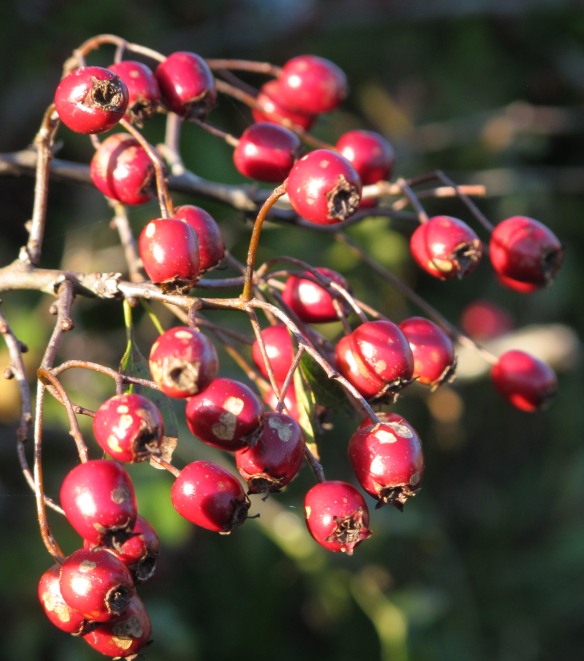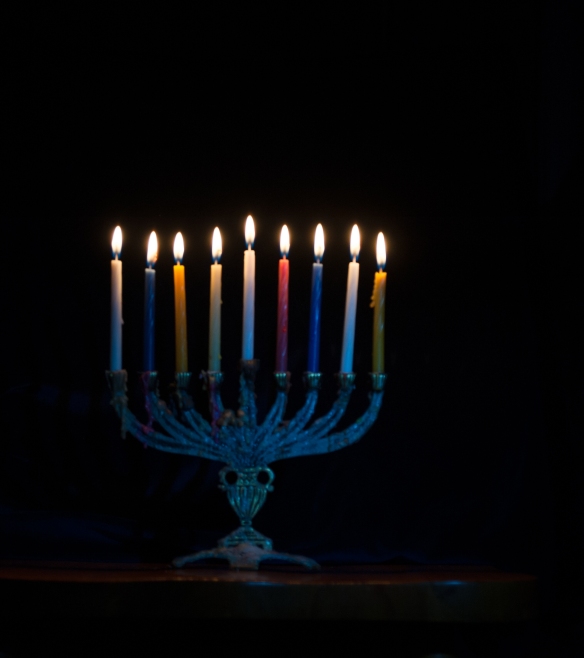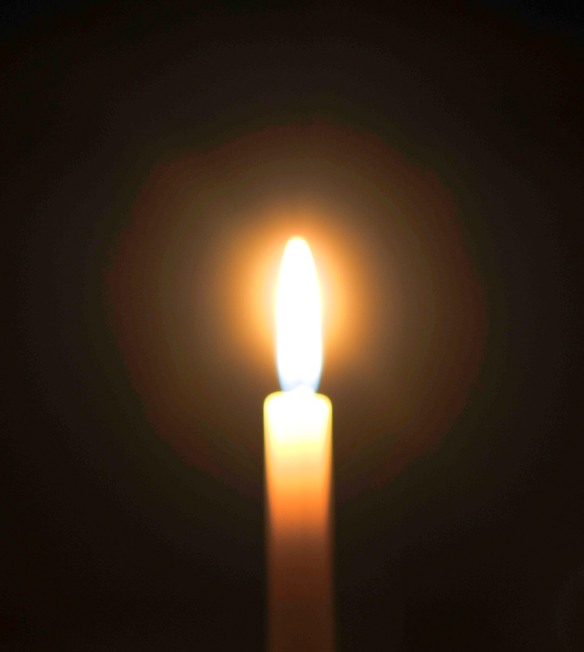Christmas carols, according to one source I found, weren’t originally Christian. They were solstice songs. Then the country was Christianized and it took the songs along with it, but they didn’t become church songs, they stayed outside, in people’s homes, as well as out of doors and in whatever the period’s equivalent of the pub was. They were seasonal folk songs.
Fast forward more than a few hundred years and Oliver Cromwell came to power, with his humorless version of Protestantism. He didn’t approve of fun, and he tried to stamp the songs out but they went underground and survived.
In the Victorian era they were rediscovered and became respectable (I think) and new carols were added.
End of history lesson. I won’t swear that it’s entirely accurate, but it seems to be somewhere in the neighborhood of accuracy. Close enough (as they say of guitar tuning) for folk music.

Semi-relevant photo: They’re not holly berries, but they’re red. And whatever they are, they’re around in the winter. Close enough for one of my posts.
One of the many shocks of moving to Cornwall was discovering that the carols sung here aren’t the songs Wild Thing and I grew up with. Sometimes the tunes are different, sometimes the words, sometimes the whole damn song’s new to us. And when we’d comment on it, as we did at first, repeatedly whoever we were talking to would look unimpressed and say, “Oh, that’s the Boscastle version.” Or “That’s the Marhamchurch version.” Or that’s some other version. As if difference were perfectly normal.
Or dainty little American souls were scandalized. Because Christmas carols? They were supposed to be unchangeable. But here was every town, every village, practically every house, with its own variation.
That does testify to the genuine folkiness of carols. That’s what folk’ll do if you turn your back on them. They’ll change stuff. They’ll create new stuff. They’ll take the stuff you think is fixed forever and make it their own.
I should admire that, and in the abstract I do. But it also pisses me off. I have a dainty little American soul. Those are Christmas carols. They’ve been through the American Commercial Christmas Network that fed my childhood and you’re not allowed to change them.
But change them people have, and they did it long before the American Commercial Christmas Network got its fake-snow-and-glittery little hands one them.
This year, like every year, Christmas carols are everywhere. Not I don’t mean just piped into stores, the way they are in the U.S., although that happens too, and it always starts too early in the year. I just got back from taking the dog to the vet (I’m writing this in early December) and they’re playing them there already. The woman at the reception desk had reached her limit the day before and turned them off, along (accidentally) with the internet. I thought it was worth sacrificing the internet to get some peace and quiet. Sadly, the whole thing was fixed by the time I showed up.
But real people will also be singing them. Every local choir and brass or silver band (and there are as many of each as there are petitions on the government petition site) will have been practicing them and looking for a time and place to inflict them on the public. Cafes and pubs will hold special events featuring carols. Someone’s head will pop out of the sink drain and start caroling.
And none of them will be the songs that I know, ignoring all the evidence to the contrary, to be unchangeable. In spite of that, and in spite of how heavily I’ve slanted my language about them, a lot of people will be happy to hear them. Probably most people. After the first one of two, I don’t happen to be among them, that’s all.
A mid-December update on how inconsistent I am about all this: Friends asked me to join them on a version of “Silent Night” at the pub’s singers night. They need an extra alto; I have a low voice. I was pleased to be asked and I said yes. They’re nice people, and good singers.
It’s a beautiful version, even if it’s not the one I know to be, ahem, right. We ran through it a few times the other day and once we started singing, the pleasure of it took over and my quibbles fell away. Except for every so often, when I’d listen to myself and think, These are very strange words for me to be singing.
Which leads me to my yearly explanation of how this Jewish atheist ended up knowing (never mind singing) Christmas carols.
First, if you live in the U.S., you can’t help knowing them. Whatever your beliefs, if you need so much as a tube of toothpaste during December (or late November, or possibly July) and go to a store to buy it, Christmas carols will drip their way into your ears and seep into your brain. No matter how sheltered your life is, you will learn them.
My life hasn’t been sheltered. I come from a family of assimilated Jews. In other words, we were Jewish but not particularly so. We didn’t keep the Jewish holidays or traditions, we weren’t religious, and I grew up celebrating Christmas as what my parents called a national holiday. Our way of celebrating, they’d have sworn, had no religious elements.
Except, of course, for the ones that snuck in. Because, second (you remember that just above we were counting the reasons I know Christmas carols?), we sang carols. They were nice songs. They were part of the holiday. Which was, in spite of all my parents could do, at its core a religious holiday. I might have been about eight when I was with my mother and listening to, or possibly singing, “Silent Night,” with its line about “round yon virgin mother and child.”
I asked what a virgin was.
“It’s a young woman who hasn’t had a baby,” my mother said.
Well, that was resolutely uninformative, although I don’t think she meant it to be. She was as direct with us about sex as she could bring herself to be, but it was the fifties, so she was fighting the weight of the culture. What I had pictured was a mother and child sitting around a fire. So okay, I understood that I had to change my picture. They were sitting around a young woman who hadn’t had a baby.
Why would they do that and how would it keep them warm?
I don’t know how many years it took me to make sense of that line.
In a lot ways, I think, the innocence of children is overvalued.
At a later Christmas, an older cousin brought a girlfriend who was a singer, and the whole extended Jewish (with a few exceptions) atheist (with at that time, I think, no exceptions) family ended up around the piano singing Christmas carols. We had a great time, and it wasn’t until decades later that I realized how funny that scene is.
So I have warm feelings about Christmas carols, but the annual piped-music assault wore a lot of them away. And then I moved from New York, where a lot of people around me didn’t celebrate Christmas, to Minnesota, where for a while it seemed that everyone did, and I missed the sense that celebrating was optional. It began to feel like a requirement, and I developed mixed feelings about the holiday.
It’s also true that I was an adult by then, and the prospect of presents didn’t give me the warm, greedy glow it once had. That could have had something to do with it too.
And now, in Cornwall, where I seem to be one of only three Jews within a forty (okay, fifteen) mile radius? I get spiky at this time of year. And I feel the urge, now and then, to remind some random person that not everyone celebrates Christmas, even if I do, and not everyone sings Christmas carols.
Occasionally I actually do that, and for the most part, the random person says, more or less, yes but it’s just a holiday. They remind me of its pagan roots. They tell me you don’t have to be a Christian to celebrate it.
And that’s true, but I’m not just not-a-Christian in terms of belief. I’m not a Christian. You see the difference?
Of course not. I don’t explain it well, at least partly, that’s because I don’t make a big thing out of being Jewish. It’s not a huge part of my life. But I am still Jewish. That’s not a simple thing to be, and I don’t want to let it disappear behind the tinsel and the music.
And with that out of the way, I’ll tell you that by the time you read this we’ll have decorated the tree–in part with ornaments my mother gave us. And we’ll light Hanukkah candles because Wild Thing, the recovering Southern Methodist, loves to.
Like I said, it’s complicated. I wouldn’t have it any other way.
Whatever you celebrate at this time of year, or celebrated if I’m late, I wish you a good one. And if you don’t celebrate anything, I wish you a moment of quiet amid all the aggressive celebrating.


